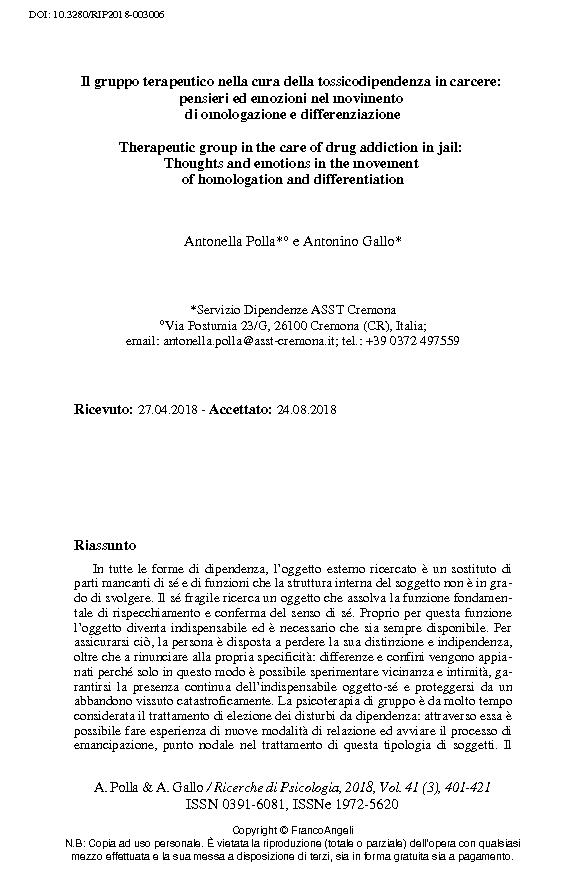Il gruppo terapeutico nella cura della tossicodipendenza in carcere : pensieri ed emozioni nel movimento di omologazione e differenziazione
401-421 p.
In tutte le forme di dipendenza, l'oggetto esterno ricercato è un sostituto di parti mancanti di sé e di funzioni che la struttura interna del soggetto non è in grado di svolgere. Il sé fragile ricerca un oggetto che assolva la funzione fondamentale di rispecchiamento e conferma del senso di sé. Proprio per questa funzione l'oggetto diventa indispensabile ed è necessario che sia sempre disponibile. Per assicurarsi ciò, la persona è disposta a perdere la sua distinzione e indipendenza, oltre che a rinunciare alla propria specificità: differenze e confini vengono appianati perché solo in questo modo è possibile sperimentare vicinanza e intimità, garantirsi la presenza continua dell'indispensabile oggetto-sé e proteggersi da un abbandono vissuto catastroficamente. La psicoterapia di gruppo è da molto tempo considerata il trattamento di elezione dei disturbi da dipendenza: attraverso essa è possibile fare esperienza di nuove modalità di relazione ed avviare il processo di emancipazione,
punto nodale nel trattamento di questa tipologia di soggetti. Il gruppo omogeneo è capace di fornire supporto a pazienti così fragili dal punto di vista narcisistico e rende possibile il confronto con l'altro che può essere sperimentato come una risorsa e non percepito nei termini di sconfitta individuale e disconoscimento di sé. La relazione con l'altro può arrivare così a costituirsi come scambio basato sul reciproco riconoscimento, rompendo in questo modo l'isolamento tipico dell'addiction o, in alternativa ad esso, l'esclusiva modalità dell'omologazione. Le vignette cliniche tratte dal lavoro di psicoterapia di gruppo svolto all'interno della Casa Circondariale di Cremona, sono tese ad evidenziare un processo continuo, che si snoda lungo tutto il percorso gruppale, caratterizzato da una oscillazione tra omologazione e differenziazione, e a mostrare come da questo stesso processo possa prendere avvio la possibilità di emancipazione. [Testo dell'editore].
In all form of addiction the external object sought is a substitute for lacking parts of self and functions that the internal structure of the subject is unable to perform. The fragile self seeks an object that fulfills the fundamental function of mirroring and confirmation of self-consciousness the sense of self. Precisely for this function the object becomes indispensable and it is necessary that it is always available. To ensure this, the person is willing to lose his differentiation and independence, as well as to renounce his specificity: differences and boundaries are smoothed because only in this way is it possible to experience closeness and intimacy, guaranteeing the continuous presence of the indispensable object- self and protect himself from a catastrophically neglected abandonment. Group psychotherapy has long been considered the treatment of choice for addictive disorders: through it is possible to experience new modes of relationship and start the process of emancipation,
a nodal point in the treatment of this type of subjects. The homogeneous group is able to provide support to patients so fragile from the narcissistic point of view and makes it possible to compare with others that can be experienced as a resource and not perceived in terms of individual defeat and self-denial. The relationship with the other can thus be constituted as an exchange based on mutual recognition, thus breaking the typical isolation of addiction or, alternatively, the exclusive method of homologation. The clinical vignettes taken from the group psychotherapy work within Cremona jail are aimed to underline a continuous process, which unfolds along the whole group path, characterized by an oscillation between homologation and differentiation, and to show how this own process can start the possibility of emancipation. [Publishers' text].
Fa parte di
Ricerche di psicologia : 3, 2018-
Articoli dello stesso fascicolo (disponibili singolarmente)
-
Informazioni
Codice DOI: 10.3280/RIP2018-003006
ISSN: 1972-5620
MATERIE
PAROLE CHIAVE
- Psicoterapia di gruppo, addiction, omologazione e differenziazione, teoria del campo
- Group psychotherapy, addiction, homologation and differentiation, Field Theory



